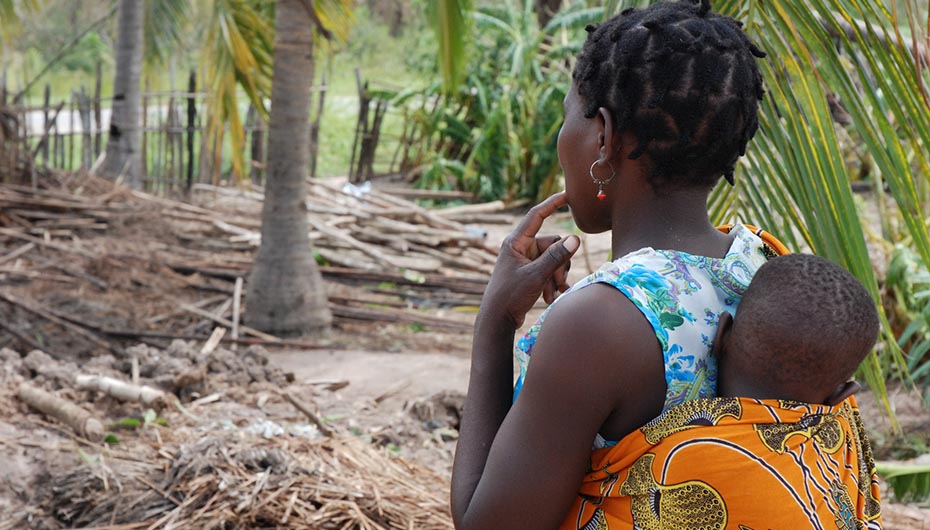Media Centre - Media release - 11 November 2019
Forced marriage and being removed from school: girls face impossible choices as food shortages spiral, affecting millions in Southern Africa

From being removed from school to forced marriage, girls are caught between impossible choices for survival as severe food shortages sweep across Zimbabwe, Zambia, Malawi and Mozambique, warns child rights and humanitarian organisation Plan International.
The ongoing food crisis in the four countries is compounded by severe drought, devastation caused by cyclone Idai, conflict and economic downturn.
“Plan International is extremely concerned by the increasing number of adolescent girls experiencing food insecurity, especially cases where they are being traded off as brides by family members in an effort to earn the next meal,” Stuart Katwikirize, Plan International’s Regional Head of Disaster Risk Management, said.
“Limited access to basic sanitation services including menstrual hygiene products and safe drinking water also very concerning. Adolescent girls from highly food-insecure areas in rural areas are considerably more likely to migrate to cities to seek food and an income. These girls face increased risks of coerced and transactional sex and exploitative labour, as well as social isolation.”
Plan international is calling on the international donor community and governments to provide urgent assistance to millions in desperate need, particularly children and adolescent girls who are at highest risk.
Plan International Australia’s CEO Susanne Legena said the multi-country crisis was expected to become a full-blown emergency by early 2020, with the situation rapidly deteriorating conditions across four countries.
“Our priority is to support children, with a particular focus on vulnerable girls who we know are already resorting to desperate measures like early marriage. They are at grave risk,” Ms Legena said.
“The risk of exposure to domestic violence and intimate partner violence is also expected to increase as a consequence of heightened family tensions during the lean season.
“We are extremely worried about the scale of this emergency and we know that without at its expected peak, millions will suffer malnutrition and we will see loss of life. Now is the time for Governments to consider increasing funding to food programs in these regions.”
Overview of a multi-country food crisis:
- In Mozambique drought, cyclones, floods and insecurity, have left an estimated 2.5 million people – almost 10 per cent of the country’s population – in need of lifesaving assistance. An estimated 67,500 children under the age of five are in need of treatment for acute malnutrition (6,500 children for severe acute malnutrition and 61,000 for moderate acute malnutrition)
A poor January-March 2019 rainy season in southern provinces (Maputo, Gaza and Inhambane) has caused substantial agricultural losses, with lingering effects expected to last until the next main harvest in February 2020.
Anne Hoff, Country Director, Plan International Mozambique said: “Adolescent girls and women are typically more affected by drought because it is their job to find water and food for the family, therefore they are more likely to drop out of school to care for their younger siblings as their parents travel long distances looking for food.”
- Zimbabwe is facing a multi-layered crisis as a result of the El Nino-induced poor seasonal rainfall, the devastating impact of Cyclone Idai and hyper-inflation and very low incomes affecting 5.5 million people. “Children are increasingly dropping out of school because of hunger issues which remains a serious concern,” said Angela Muriithi, Country Director, Plan International Zimbabwe. “An estimated 2.2 million people in urban areas are facing food and economic insecurity, with 53% of households in Harare reporting inability to pay school fees.”
- In Zambia, about 2.3 million people will suffer from food insecurity during the lean season, between October 2019 and March 2020, following the devastating effects of erratic rains, drought, water logging and the late start to the 2018/2019 rainy season which had affected agriculture production. “Overall purchasing power is fast deteriorating for most vulnerable households, making the situation dire for women and girls. If urgent humanitarian action is not taken to assist communities in desperate need, things will get much worse,” said Ramin Shahzamani, Country Director, Plan International Zambia
- In Malawi, one million people (7% of the population) are expected to be severely food insecure by March 2020, affecting 27 out of 28 districts. The main drivers of food insecurity in Malawi this season include floods, drought, infestations of armyworm, and high prices for staple foods compared to last year and the 5-year average.
Media Contact
Jane Gardner, Media & Ambassador Manager, 0438 130 905/ jane.gardner@plan.org.au
About Plan International Australia
Plan International Australia works around the world to tackle the root causes of poverty, inequality and injustice for children. Plan International strives to make girls truly visible: acknowledging their power and potential, and taking a stand when they are exploited, discriminated against and silenced – this includes abroad and in Australia.
Media contacts


